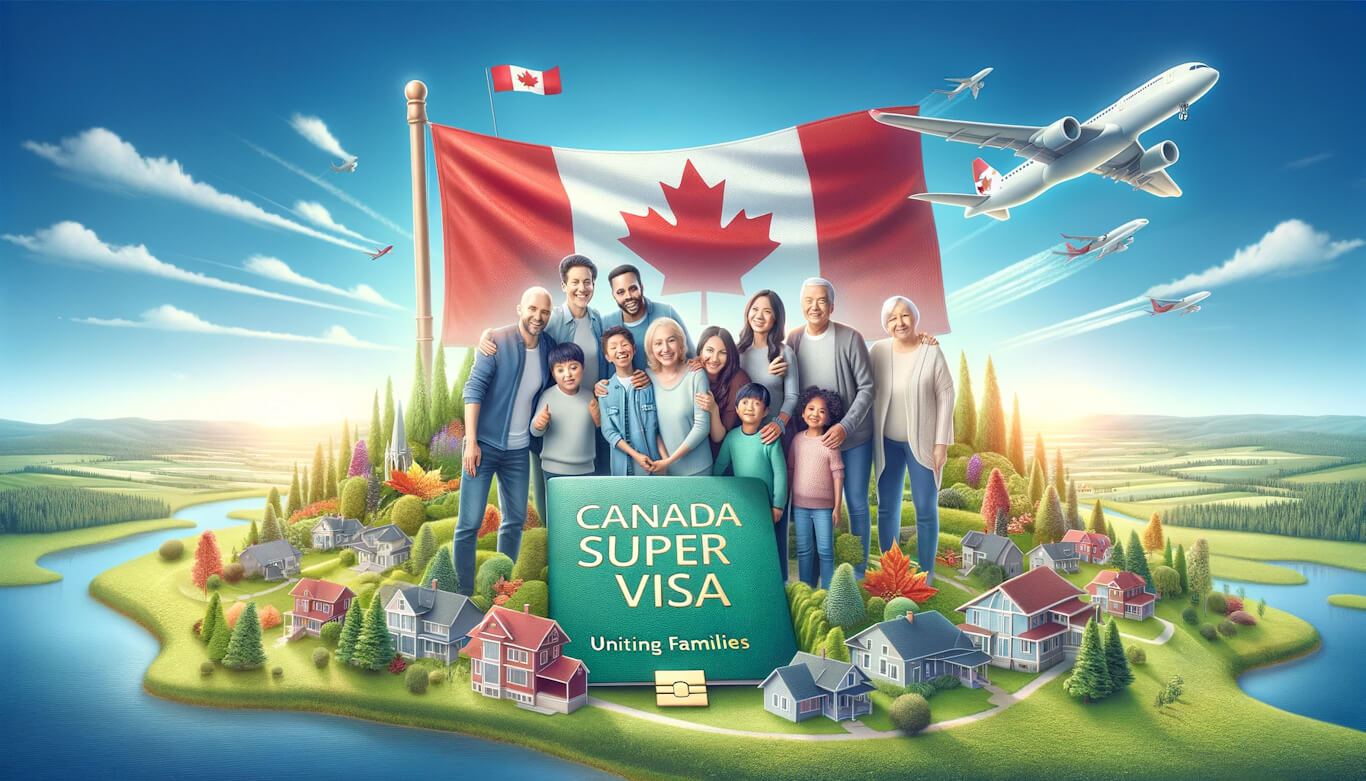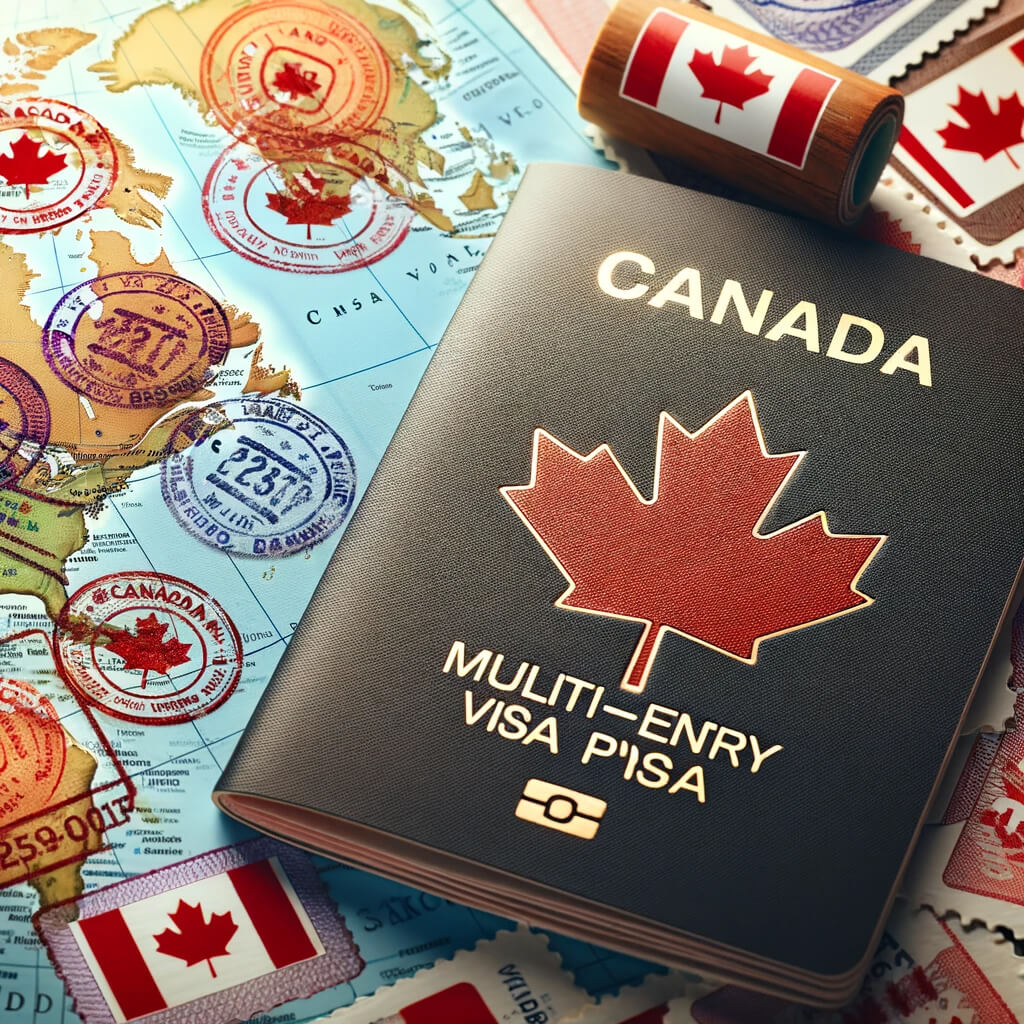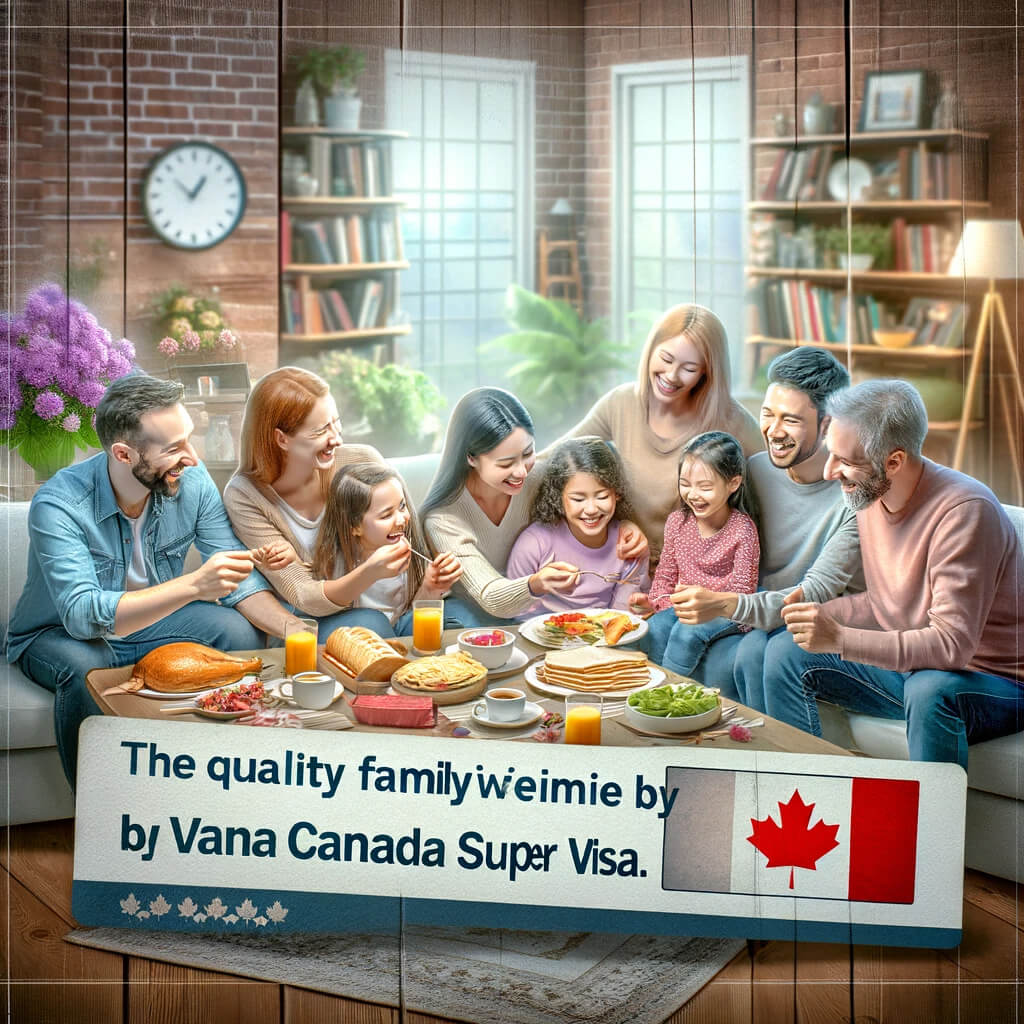Canada Super Visa for Parents: Your Canadian Guide for Family Visits
Your Quick 30-Second Answer!
The Canada Super Visa is a special visa for parents and grandparents of Canadian citizens or permanent residents, allowing multiple entries for up to 10 years with each stay lasting up to 5 years. Eligibility requires being a parent or grandparent of a Canadian, having an invitation letter from them including financial support, and proof of medical insurance from a Canadian company. This insurance must cover healthcare, hospitalization, and repatriation with a minimum coverage of CAD $100,000 and be valid for at least one year. The application process involves applying online through the IRCC Portal, completing an online form, and paying a fee. Super Visa holders are not allowed to work or study in Canada, and there is no age limit for applicants, but a medical exam is required.
For an in-depth overview, please see the "Table of Contents" below.
Simplifying Canada Super Visa for Parents to help Canadians with Family Reunion
Welcome to this easy-to-follow guide on the Canada super visa to help Canadians bring their for parents and grandparents for visit.
TABLE OF CONTENT
Understanding Basics
1. Who should use this Guide?
2. Program Overview
Eligibility and Application
3. Eligibility Criteria
4. Application Steps
5. Necessary Documents
6. Processing Explained
Challenges and Maintenance
7. Overcoming Issues
8. Visa Maintenance
Advanced Strategies
9. Path to Residency
10. Application Tips
11. Crucial Insights
12. Fictional Scenario
Resources and Assistance
13. Time and Expenses
14. Questions Answered
15. Finding Resources

1. Who should use this Guide?
This immigration information resource will help you understand how to obtain the Canada Super Visa, what you need, and what's good about having one. If you want to stay in Canada for a short while, maybe for vacation, school, work, or to visit family, you can get what's called a Temporary Residence in Canada. It's like a special permission that lets you stay in Canada for a set time. But, it's different from those who live there indefinitely permanent residence because you can't stay forever and you have to follow some rules based on why you're there. If you're thinking about going to Canada for a short visit, it's really important to know how to get this temporary permission or Visitor Visa.
The Canada Super Visa is a unique Temporary Resident Visa (TRV) primarily for parents and grandparents of Canadian citizens or permanent residents. It allows multiple entries into Canada for a duration of up to 10 years, with each entry permitting a stay of up to 5 years.
Eligibility Criteria
To be eligible for the Super Visa, applicants must:
Health Insurance Requirement
- Be a parent or grandparent of a Canadian citizen or permanent resident.
- Have an invitation letter from their child or grandchild in Canada. This letter should include financial support commitment, a list of household members, and a copy of the Canadian citizenship or permanent resident document.
A crucial requirement for the Super Visa is obtaining private medical insurance from a Canadian insurance company. The insurance must:
Application Process
- Cover health care, hospitalization, and repatriation.
- Provide a minimum coverage of CAD $100,000.
- Be valid for at least one year from the date of entry into Canada.
The application for a Super Visa involves:
Processing Time and Cost
- Applying online through the IRCC Portal.
- Getting an invite code to create an account.
- Completing an online form and uploading the necessary documents.
- Paying the application fee via credit card.
The processing time for the Super Visa varies depending on several factors, including the country of application. The cost of health insurance varies based on age, health, and the provider, with affordable options like GMS Insurance, Manulife, Blue Cross, Sun Life, and Desjardins available.
Restrictions and Additional Information
Super Visa holders are not permitted to work or study in Canada. The visa is intended for family reunification. There is no specific age limit for applicants, but they must undergo a medical examination.
2. Introduction: A Quick Look at the Program

The Canada Super Visa Program: A New Look at Family Reunification
The Canada Super Visa program is a unique immigration category, offering a new look at how permanent residents and Canadian citizens can bring their parents and grandparents closer. This official document provides easier access for sponsored family members, particularly parents and grandparents of Canadian permanent residents or citizenship Canada holders, to spend quality time with their loved ones in Canada. Here's an overview, incorporating your requested keywords:
Key Features and Advantages
- 1. Extended Stay and Easier Access
- The Super Visa allows an extended stay for foreign nationals, offering up to five years per entry in Canada. This feature is one of the favorite aspects of the program, contrasting with the normal processing times and limitations of an entry visa through regular visitor visas.
- 2. Long Validity and Flexibility
- The validity of this travel document extends up to 10 years, facilitating multiple entries into Canada. This flexibility is particularly beneficial for families who might be living in the United States or other countries, ensuring that they don't miss out on important family events due to border crossing issues.
- 3. Streamlined Process
- The application process for the Super Visa is streamlined, significantly reducing the administrative burden. An immigration consultant can guide applicants through the following steps, including filling out the required web form and updating their email address for status updates.
Lesser-Known Benefits
- 1. Family Time and Cultural Preservation
- The Super Visa fosters closer family bonds and cultural preservation. It allows grandparents, as foreign nationals, to actively participate in their dependent child or children's lives in Canada, maintaining cultural traditions.
- 2. Support System and Peace of Mind
- For new permanent residents or those on a work permit in Canada, having their parents or common-law partners nearby provides emotional and practical support, easing their transition into Canadian life.
Eligibility and Requirements
- Medical Examination and Insurance
- Applicants must undergo a medical examination and secure private medical insurance coverage, confirming their eligibility as a foreign national to travel to Canada.
- Financial Support and Low Income Cut-Off
- The Canadian citizen or permanent resident sponsoring family members must meet specific financial thresholds, adhering to the low income cut-off requirements.
- Official Documentation and Application Fee
- The process includes submitting official documents verifying the relationship (like date of birth certificates) and paying the application fee. A travel agent or immigration consultant can assist in ensuring all paperwork, including sponsorship applications, is correctly handled.
In summary, the Super Visa program is not just about reuniting families; it's about enriching the Canadian experience for permanent residents and their loved ones. It stands out as the best way for Canadian citizens to sponsor their parents or grandparents, ensuring they can enjoy extended, meaningful stays in Canada.
3. What are the Eligibility Requirements
Let's simplify the details on Eligibility Criteria for Canadian super visa to Canada. Let's break down the essentials so they are easy and simple to understand.
PROGRAM REQUIREMENTS
Show Family Ties
Prove your relationship with family in Canada using documents like a birth certificate. Ensure they're clear and readable.
Health Checkup
Complete a medical check to confirm you're healthy. Schedule this early and keep track of any changes in requirements.
Get Health Insurance
Secure health insurance from a Canadian company, valid for one year and covering at least $100,000. Review all details carefully.
Write Invite Letter
Your family in Canada must write a detailed invitation letter, promising financial support and listing all household members.
Prove Money Backing
Show proof of sufficient income, like tax records or pay stubs, from your Canadian family. Understand the minimum income rules.
Share Bank Details
Provide bank statements if necessary, to show you or your family can afford the visit. Keep all records clear and consistent.

Let's delve into the eligibility criteria for the Canada super visa for parents, breaking them down into detail and shedding light on often overlooked aspects that could result in application delays or rejections. Understanding these criteria thoroughly can help applicants navigate the process more smoothly.
1. Proof of Relationship:
To be eligible for the Canadian Super Visa for parents, applicants must provide evidence of their relationship to a Canadian citizen or permanent resident child or grandchild. This relationship can be established through various official documents, such as:
- Birth Certificate: Providing a copy of the child's or grandchild's birth certificate clearly establishes the parent-child or grandparent-grandchild relationship.
- Baptismal Certificate: Another official document that can be used to demonstrate the familial relationship.
- Other Official Documentation: In some cases, other official documents naming the applicant as the parent or grandparent may be accepted.
Insight: While the requirement itself is straightforward, applicants should ensure that the provided documents are clear and legible. Any discrepancies or ambiguity could lead to delays or requests for additional documentation.
2. Immigration Medical Examination and Admissibility:
Applicants must undergo an immigration medical examination to establish their admissibility to Canada on health grounds. This examination is crucial to ensure that the applicant does not pose a health risk to the Canadian population.
Insight: It's essential for applicants to schedule this examination well in advance to avoid delays. Additionally, staying updated on any changes in medical examination requirements is vital, as these criteria may evolve over time.
3. Private Medical Insurance:
Canada super visa for parents applicants are required to obtain private medical insurance from a Canadian insurance company. This insurance must be valid for a minimum of one year from the date of entry and provide coverage for health care, hospitalization, and repatriation. It should also offer a minimum of $100,000 in emergency coverage.
Insight: Applicants should carefully review insurance policies to ensure they meet these specific requirements. Paying attention to the coverage details and the validity period is crucial.
4. Letter of Invitation:
A letter of invitation written and signed by the host child or grandchild is necessary. This letter should include a promise of financial support for the entire intended stay in Canada and a list of all household members in Canada, including the visiting parents or grandparents. Click the following link for an example of Canada Super Visa Invitation Letter.
Insight: The host child or grandchild should provide detailed and accurate information in the invitation letter. Any discrepancies in the information provided can lead to complications in the application process.
5. Financial Support:
The host child or grandchild must prove that their household meets the low-income cut-off (LICO) to support the visitor financially during their stay. Certain documents, such as tax records, pay stubs, or a letter from an accountant, can be used to demonstrate financial support.
Insight: Applicants and hosts should ensure that they have a clear understanding of the LICO requirements and the specific documents accepted as proof of financial support. Meeting these financial criteria is essential for a successful application.
6. Bank Statements:
Bank statements may be required to provide additional evidence of financial support. These statements should demonstrate the ability to cover the visitor's expenses during their stay in Canada.
Insight: Applicants should maintain transparency in their financial records. Any inconsistencies in the bank statements can raise concerns during the application process.
In summary, the eligibility requirements for the Canada Super Visa for parents are comprehensive, and attention to detail is crucial. By understanding and fulfilling these criteria, applicants can enhance their chances of a successful application and ensure that they do not encounter unexpected delays or rejections. Being thorough and proactive in addressing these requirements is essential for a smooth visa application process.
4. Application Process for a Canadian Super Visa for parents
Here is the application process for a Canadian Super Visa for parents, providing expert tips for each stage and highlighting practical strategies applicants can use to enhance their application while avoiding common pitfalls.
1. Gathering Required Documents:
The first step is to compile all the necessary documents. These include proof of relationship, medical examination results, private medical insurance, a letter of invitation, proof of financial support, and bank statements.
Expert Tip: Start collecting these documents well in advance. Ensure that they are up to date and complete. Any missing or outdated information can cause delays.
2. Filling Out the Application Form:
Applicants must complete the Canada super visa application form accurately. This form collects essential information about the applicant, their host in Canada, and the purpose of the visit.
Expert Tip: Double-check all information for accuracy. Incomplete or incorrect forms can lead to rejections. Seek assistance if needed to ensure the form is filled out correctly.
3. Immigration Medical Examination:
Schedule the required immigration medical examination with an approved panel physician. The results will determine your admissibility to Canada on health grounds.
Expert Tip: Schedule the medical examination well in advance of your application. Ensure that the panel physician is authorized by Immigration, Refugees, and Citizenship Canada (IRCC).
4. Private Medical Insurance:
Purchase private medical insurance from a Canadian insurance company. Ensure that it meets the specific requirements, including coverage for health care, hospitalization, repatriation, and a minimum of $100,000 in emergency coverage.
Expert Tip: Compare insurance policies and choose one that best suits your needs. Pay close attention to the coverage details and the validity period.
5. Letter of Invitation:
The host child or grandchild in Canada must write and sign a letter of invitation. This letter should include a promise of financial support and a list of all household members.
Expert Tip: Ensure that the letter is comprehensive and provides all required information. The host should be clear about their commitment to financial support.
6. Proof of Financial Support:
The host must demonstrate that their household meets the low-income cut-off (LICO) requirements. This can be proven through documents such as tax records, pay stubs, or a letter from an accountant for Canada Super Visa.
Expert Tip: Hosts should maintain organized financial records and seek professional guidance if necessary to meet the LICO requirements.
7. Bank Statements:
Bank statements may be required to provide additional evidence of financial support. These statements should reflect the ability to cover the visitor's expenses during their stay.
Expert Tip: Ensure that the bank statements are clear and complete. They should align with the financial information provided in the application.
8. Submitting the Application:
Complete the application package with all required documents and fees. Submit it to the appropriate visa office or application center.
Expert Tip: Use a secure and trackable method to send your application. Keep copies of all documents and receipts for your records.
9. Interview (if required):
In some cases, applicants may be asked to attend an interview at a local visa office or application center. Prepare thoroughly for the interview and bring all required documents.
Expert Tip: Practice answering potential interview questions with confidence. Review all documents before the interview for the Canada Super Visa.
10. Wait for Processing:
Processing times may vary, but applicants can check the status of their application online. Be patient during this phase.
Expert Tip: Monitor the processing times on the official website and plan your travel accordingly. Avoid making any non-essential travel arrangements until you receive a decision.
In conclusion, the Canadian Super Visa for parents application process involves several steps, each with its own set of requirements. By following these expert tips and strategies, applicants can navigate the process more smoothly, reduce the risk of delays or rejections, and increase their chances of obtaining this valuable visa to reunite with their loved ones in Canada.
5. What are the Required Documents?

Comprehensive Documentation Guide for the Canadian Super Visa for Parents
Navigating the application process for the Canadian Super Visa for parents or grandparents requires meticulous attention to detail and a comprehensive understanding of the required documentation. In this guide, we will break down the critical documents needed, delve into their specifics, and offer expert recommendations to ensure a successful application.
1. Proof of Relationship:
- Specifics: To demonstrate the familial connection between the applicant and the Canadian citizen or permanent resident child or grandchild, you should provide a copy of the child's or grandchild's birth certificate, baptismal certificate, or any official document establishing the relationship.
- Expert Tip: Ensure that these documents are clear and legible, as any ambiguity may lead to delays in processing.
2. Immigration Medical Examination:
- Specifics: Applicants must undergo an immigration medical examination conducted by a designated panel physician. This examination ensures admissibility to Canada on health grounds.
- Expert Tip: Schedule the medical examination well in advance and keep copies of all medical records for reference.
3. Private Medical Insurance for the Canada Super Visa:
- Specifics: Applicants are required to obtain private medical insurance from a Canadian insurance company. This insurance must cover health care, hospitalization, and repatriation, with a minimum of $100,000 in emergency coverage. It should be valid for each entry to Canada.
- Expert Tip: Research insurance providers and policies to select one that suits your needs and budget. Ensure that you pay the premium in full, as installments are not accepted.
4. Letter of Invitation:
- Specifics: A letter of invitation from the host child or grandchild is essential. It should include a promise of financial support for the duration of the applicant's stay, a list of household members, and a copy of the host's Canadian citizenship or permanent resident document.
- Expert Tip: Collaborate closely with the host child or grandchild to create a comprehensive and convincing invitation letter. Highlight the financial support aspect clearly.
5. Proof of Financial Support:
- Specifics: The sponsor (child or grandchild) must prove that their household meets the low-income cut-off (LICO) requirements. Documents such as Notice of Assessment (NOA), T4 or T1 forms, pay stubs, employment insurance benefit statements, and letters from accountants may be used.'
- Expert Tip: If the sponsor's income is insufficient, consider involving a co-signer who meets the LICO minimum. Gather all necessary income-related documents.
6. Employment Verification:
- Specifics: If the sponsor is employed, an original letter from their employer stating the job title, description, and salary is required for Canada Super Visa.
- Expert Tip: Request this letter from the employer well in advance to avoid any delays in document submission.
7. Bank Statements:
- Specifics: Applicants should provide bank statements to demonstrate their financial stability and ability to cover expenses during their stay.
- Expert Tip: Maintain a consistent and sufficient balance in your bank account to showcase financial reliability.
8. Additional Supporting Documents:
- Specifics: Depending on your individual circumstances, additional documents such as divorce certificates, marriage certificates, custody agreements, or adoption papers may be required.
- Expert Tip: Review the specific requirements based on your situation and include all necessary documents to avoid complications.
In conclusion, compiling the requisite documentation for a Canadian Super Visa application demands meticulous attention to detail and adherence to specific guidelines. By proactively preparing these documents, ensuring their accuracy and completeness, and staying informed about the latest immigration policies, applicants can enhance their chances of a successful and expedited application process.
6. How is the Application processed?
Navigating the Canada Super Visa Application Process: A Comprehensive Guide
The application process for the Canadian Super Visa for parents or grandparents is a crucial step in reuniting families. While official guidelines provide a general overview, understanding the background processing and ensuring a successful application requires a deeper dive into the unseen aspects and unique perspectives of the program.
1. Eligibility Assessment:
- Behind the Scenes: After you submit your application, the Canadian authorities conduct a rigorous eligibility assessment. This includes verifying your relationship with the sponsoring child or grandchild, reviewing your medical examination results, and assessing your financial support.
- Insights: Ensure that all submitted documents are accurate, complete, and meet the program's requirements. Consistency and transparency in your application are essential.
2. Medical Examination Processing:
- Behind the Scenes: The immigration medical examination is evaluated by panel physicians authorized by the Canadian government. They assess your health and admissibility to Canada on medical grounds.
- Insights: Schedule your medical examination well ahead of time to allow for potential follow-up tests or consultations. Maintain open communication with the panel physician to address any concerns promptly.
3. Insurance Verification:
- Behind the Scenes: Your private medical insurance is reviewed to ensure it meets the stipulated criteria, such as coverage for health care, hospitalization, and repatriation.
- Insights: Choose your insurance provider wisely, considering factors like reputation, customer service, and policy coverage. Pay the premium in full to avoid application delays.
4. Host's Financial Eligibility:
- Behind the Scenes: The financial eligibility of the host child or grandchild is closely examined to ensure they can provide the promised financial support.
- Insights: Collaborate closely with the host to prepare a robust financial support package. Documentation like tax assessments and pay stubs should clearly demonstrate financial capability.
5. Security and Background Checks:
- Behind the Scenes: Security and background checks are conducted on applicants to assess their admissibility to Canada Super Visa.
- Insights: Be truthful in your application and provide accurate information. Any discrepancies may lead to delays or rejections.
6. Document Authentication:
- Behind the Scenes: All documents provided, such as birth certificates and marriage certificates, undergo thorough authentication and verification.
- Insights: Ensure that documents are notarized or authenticated as required. Keep copies of all submitted documents for your records.
7. Delays and Processing Times:
- Behind the Scenes: Application processing times may vary, and delays can occur due to a high volume of applications or incomplete documentation.
- Insights: Apply well in advance of your intended travel date and check for processing time updates regularly. Ensure all documents are submitted correctly to minimize delays.
8. Ongoing Communication:
- Behind the Scenes: During processing, authorities may contact applicants for additional information or clarification.
- Insights: Maintain open and prompt communication with the immigration authorities. Respond to requests for information as quickly as possible.
In conclusion, a successful Canada super visa application requires careful attention to detail, thorough documentation, and an understanding of the background processing involved. By adhering to program requirements, maintaining transparency, and proactively addressing potential challenges, applicants can navigate the application process with confidence and increase their chances of a successful reunion with their loved ones in Canada.
7. Challenges and How to Overcome Them:
Challenges and How to Overcome Them:
Today, we delve into the challenges faced by families under the Canadian Super Visa program, focusing on those that may not be immediately apparent. Moreover, we will provide proactive strategies, including alternative approaches, to address these challenges effectively.
1. Financial Strain:
Challenge: The Canada super visa requires applicants to have private medical insurance, and the cost of insurance premiums can be substantial, especially for elderly parents or grandparents.
Alternative Approach: Consider exploring group insurance policies offered by community organizations or cultural associations. These policies may provide more affordable rates for a group of individuals, thus reducing the financial burden on the family.
2. Health and Well-Being:
Challenge: Elderly visitors may face health issues during their stay in Canada, and accessing healthcare can be complicated.
Alternative Approach: Families can explore telehealth services, which enable remote medical consultations. This innovative approach can help address minor health concerns without the need for in-person visits, making healthcare more accessible.
3. Language Barrier:
Challenge: Visitors who are not proficient in English or French may face challenges in communication and daily life.
Alternative Approach: Consider enrolling elderly family members in language courses tailored for senior learners. Many community centers offer such classes, designed to meet the unique needs of older adults, and promote social engagement and integration.
4. Loneliness and Isolation:
Challenge: Elderly visitors may experience loneliness, especially if they are not familiar with Canadian culture and have limited social connections.
Alternative Approach: Encourage and facilitate participation in local seniors' clubs, cultural groups, or volunteering opportunities. These activities can provide a sense of belonging and reduce feelings of isolation.
5. Navigating Canadian Systems:
Challenge: Understanding and navigating Canadian systems, such as healthcare, banking, and transportation, can be overwhelming for newcomers.
Alternative Approach: Connect with local immigrant support organizations that offer settlement services. These organizations can provide guidance on essential matters and facilitate the integration process.
6. Cultural Adjustment:
Challenge: Adapting to a new culture can be challenging, and families may struggle to balance their own cultural traditions with the Canadian way of life.
Alternative Approach: Promote intergenerational dialogue and cultural exchange within the family. Sharing traditions and experiences can help bridge cultural gaps and create a more harmonious environment.
7. Legal and Immigration Matters:
Challenge: Navigating legal and immigration matters, such as visa extensions, can be complex.
Alternative Approach: Seek legal assistance from immigration experts who specialize in Super Visa matters. They can provide expert guidance on visa extensions and other legal requirements, reducing the family's administrative burden.
8. Long-Term Planning:
Challenge: Families may face uncertainty about the long-term plans of their elderly parents or grandparents in Canada.
Alternative Approach: Initiate discussions and create a clear long-term plan that includes options for permanent residency or citizenship. Understanding the available pathways can provide peace of mind and a sense of stability.
In summary, while the the Canada Super Visa for parents and grandparents offers a valuable opportunity for family reunification, it comes with its set of challenges, some of which may not be immediately apparent. By proactively addressing these challenges with alternative approaches and seeking support from relevant resources, families can enhance the overall experience for their elderly loved ones and make their stay in Canada more comfortable and fulfilling.
8. Maintaining Your Canadian Super Visa for Parents:

Maintaining Your Canada super visa for Parents:
Today, we unravel the obligations and conditions that accompany a Canadian Super Visa for parents and grandparents. While official documentation outlines the basics, there are hints that visa holders should be aware of to ensure a smooth and hassle-free experience. Let's explore these hints and understand how maintaining this visa differs from others.
1. Entry and Exit Requirements:
Condition: Super Visa holders are allowed multiple entries into Canada during the visa's validity period. However, each entry should not exceed a stay of up to two years.
Hint: It's essential to keep track of entry and exit dates to avoid overstaying. Failure to abide by these rules could result in future visa denials.
2. Health Insurance Obligation:
Condition: Super Visa applicants must provide proof of private medical insurance valid for at least one year from the date of entry, with a minimum coverage of $100,000.
Hint: Visa holders should continuously maintain this insurance coverage throughout their stay. Letting it lapse could lead to potential issues accessing healthcare services in Canada.
3. Income Requirements for Hosts:
Condition: Hosts (the child or grandchild inviting the applicant) must meet a minimum income threshold to support their family members during their stay.
Hint: In some cases, a co-signer may be required to meet the income threshold. It's vital to ensure financial documentation remains updated to meet this requirement.
4. Understanding the Two-Year Renewal:
Condition: Super Visa holders are initially granted a two-year authorized stay. They can apply for an extension from within Canada before this period expires.
Hint: Visa holders should be proactive about the renewal process, as failing to do so could result in a loss of status and the need to reapply from outside Canada.
5. Adherence to Visitor Status for the Canada Super Visa:
Condition: Super Visa holders are visitors to Canada, and they must adhere to the terms of their visitor temporary residence status. This includes not engaging in unauthorized work or studies.
Hint: Even though Super Visa holders can stay for an extended period, they should not assume the privileges of permanent residents or citizens. Any breach of visitor status may have consequences.
6. Implications of Permanent Residency Applications:
Condition: Super Visa holders may wish to explore pathways to permanent residency. However, applying for permanent residency can affect their Super Visa status.
Hint: Seek guidance from immigration experts when considering a shift to permanent residency. Understanding the implications on Super Visa status is crucial to avoid unexpected issues.
7. Regular Status Checks:
Condition: Visa holders should regularly check their visa status and any updates or changes in immigration policies.
Hint: Immigration policies can evolve, and it's essential to stay informed to ensure ongoing compliance with the latest regulations.
8. Document Retention:
Condition: Keep all relevant documents, including visa approval letters, medical insurance certificates, and financial records.
Hint: Having organized records can streamline future applications or inquiries and provide proof of compliance if necessary.
In summary, maintaining a Canadian Super Visa for parents involves adherence to specific conditions and hints that may not be explicitly stated in official documentation. By staying vigilant, understanding these hints, and seeking professional guidance when needed, visa holders can ensure a successful and trouble-free experience while reuniting with their loved ones in Canada.
9. Moving to Permanent Residency from the Canada Super Visa
Navigating from a Canadian Super Visa to Permanent Residency: An Expert Guide
For many families, possessing a Canadian Super Visa for parents or grandparents marks the initial step in their Canadian journey. Permanent residency (PR) often serves as the ultimate objective. In this segment, we will dissect the path from a Super Visa to the attainment of PR status. We will delve into the hidden considerations, potential obstacles, and strategic maneuvers that can facilitate this transition.
1. Comprehending the Visitor Status:
Consideration: While holding a Super Visa, you assume the status of a visitor in Canada, distinct from a permanent resident. This status carries specific implications regarding eligibility for PR applications.
Strategic Move: Adhere scrupulously to your visitor status to prevent any breaches that could jeopardize your subsequent PR application. Refrain from engaging in unauthorized employment or academic pursuits.
2. Constructing Express Entry Eligibility:
Consideration: Canada's Express Entry system offers a popular avenue to PR, but it mandates specific criteria such as language proficiency, educational background, work history, and age.
Strategic Move: If your intention is to transition to PR through Express Entry, contemplate enhancing your language proficiency, accumulating Canadian work experience, or augmenting your educational qualifications, if necessary.
3. Provincial Nominee Programs (PNPs):
Consideration: Numerous provinces administer their own PNPs, which can expedite the journey to PR. Each PNP maintains distinct eligibility prerequisites.
Strategic Move: Investigate and evaluate PNPs that align with your competencies, professional experience, and geographic location within Canada. Certain PNPs offer streams tailored to family reunification.
4. Satisfying Minimum Income Requirements for Canada Super Visa:
Consideration: PR applicants frequently must meet stipulated income thresholds to sponsor their parents or grandparents.
Strategic Move: Confirm that your child or grandchild (the sponsor) satisfies these income criteria and contemplate the possibility of co-signing or providing supplementary financial support, if needed.
5. Evaluating Family Class Sponsorship Waiting Times:
Consideration: Family Class sponsorship for parents and grandparents often involves substantial wait times, sometimes extending over several years.
Strategic Move: Exercise patience and maintain a realistic outlook regarding these waiting durations. During this interim, uphold your visitor status and fulfill other eligibility prerequisites.
6. Consulting with Immigration Professionals about :
Consideration: Navigating the pathway to PR can be intricate, with evolving policies and regulations.
Strategic Move: Seek counsel from immigration specialists who can furnish tailored guidance and strategies based on your individual circumstances.
7. Legal Representation for Permanent Residency Applications:
Consideration: The PR application process encompasses extensive documentation and legal requisites.
Strategic Move: Contemplate enlisting the services of a legal representative well-versed in PR applications. Their expertise can ensure the completeness, accuracy, and conformity of your application with immigration legislation.
8. Staying Abreast of Immigration Policies:
Consideration: Immigration policies are subject to change, potentially impacting eligibility criteria and processing timelines.
Strategic Move: Stay apprised of policy updates and adapt your strategy accordingly. A proactive approach can forestall unforeseen impediments.
9. Perseverance and Resilience:
Consideration: Progressing from a the Canada Super Visa to PR status may entail a protracted and challenging journey.
Strategic Move: Uphold a positive outlook and remain resolute in your pursuit. Recognize that the process may encompass peaks and valleys, but persistence can culminate in triumph.
In summation, effecting the transition from a Canadian Super Visa to permanent residency is feasible through meticulous planning and strategic maneuvers. By assimilating the subtleties of this voyage, seeking professional counsel, and cultivating patience and adaptability, you can adeptly navigate potential hurdles and secure a promising future for your family in Canada.
10. What to do (or avoid) in my application?
Do's for the Canadian Super Visa Application:
Thorough Documentation: When applying for a Canadian Super Visa for your parents or grandparents, meticulous documentation is your best ally. Beyond merely gathering the required papers, ensure that they are complete, well-organized, and translated correctly if not in English or French. Make use of checklists to track your progress and verify each document's authenticity. This level of detail reduces the risk of applications being delayed or denied due to incomplete or incorrect paperwork.
Financial Preparation: A critical aspect of the Canada Super Visa application is the financial requirement. To meet this, maintain a transparent financial history. Demonstrating stable and reliable income sources is key. Not only does this prove your capacity to support your parents or grandparents during their stay, but it also showcases your ability to meet the financial support criterion. This financial stability provides assurance to Canadian authorities about your ability to provide for your family members during their visit.
Detailed Invitation Letter: Crafting a well-structured invitation letter is an often underestimated aspect of the application process. The letter should encompass various elements, including the promise of financial support for the entire duration of their stay, details about your household in Canada (including visiting parents or grandparents), and a copy of your Canadian citizenship or permanent resident document. By providing a comprehensive and genuine letter, you present a stronger case that highlights your commitment to your loved ones' well-being and the authenticity of their visit.
Timely Medical Examination: The Super Visa application necessitates a mandatory medical examination. To avoid unnecessary delays, arrange this examination as early as possible. Keep in mind that unforeseen complications, such as medical conditions requiring further assessment, can occur. Initiating the medical examination well in advance of your application submission deadline ensures ample time for any additional tests or evaluations, if needed.
Regular Follow-Up: Once you've submitted your Super Visa application, don't adopt a "set it and forget it" approach. Regularly monitor the status of your application through the official portal. By staying proactive and attentive to updates or requests for additional information, you can promptly address any concerns or inquiries from immigration authorities, expediting the processing of your application.
Don'ts for the the Canada Super Visa Application:
Incomplete Applications: One of the gravest mistakes applicants can make is submitting an incomplete application. Even minor omissions or missing documents can lead to delays or outright rejection. Avoid this pitfall by double-checking all requirements, forms, and supporting documents before submission.
Misrepresentation: Honesty is paramount throughout the application process. Providing false or misleading information, whether intentionally or unintentionally, can lead to visa refusal and potential inadmissibility to Canada in the future. Always ensure that the information you provide is accurate and verifiable.
Last-Minute Rush: Procrastination is the enemy of a successful Super Visa application. Waiting until the last minute to compile and submit your documents can lead to unnecessary stress and complications. Delays can occur, and unforeseen issues may arise, disrupting your plans. Start the application process well in advance of your intended visit.
Insufficient Insurance: The Super Visa requires applicants to obtain medical insurance from a Canadian provider that offers comprehensive coverage. Do not compromise on this requirement by selecting a policy with inadequate coverage. Inadequate insurance can result in your visa being denied. Opt for policies that not only meet but exceed the minimum coverage thresholds to ensure the health and well-being of your parents or grandparents during their stay.
Overlook Financial Proof: Meeting the financial support criterion is a crucial aspect of a successful Super Visa application. Don't underestimate its importance. Failing to provide compelling evidence of your ability to financially support your visiting family members can lead to application rejection. Ensure that you thoroughly document your financial capacity through official documents like tax assessments, pay stubs, and bank statements.
By adhering to these Do's and Don'ts, you can navigate the Canadian Super Visa application process with confidence, increasing your chances of a successful outcome and ensuring a smooth and memorable visit for your loved ones.
11. Ten Key Insights for Your Application

Expert Application Insights for Canada Super Visa for Parents:
1. Comprehensive Financial Planning: Beyond meeting the income requirement, applicants should consider creating a detailed financial plan. This plan should encompass not only the minimum income but also factors like taxation, debts, and even currency exchange rates if applicable. A comprehensive financial strategy can help ensure a smooth and stress-free visit for parents or grandparents.
2. Healthcare Beyond Insurance: While private medical insurance is mandatory, applicants should delve deeper into the coverage. Understand the fine print of the policy, including what medical services it includes and any potential exclusions. Look for policies that provide coverage for pre-existing conditions, as these can be crucial during an extended stay.
3. Consideration of Language Barriers: It's important to acknowledge that language barriers can affect the well-being of visiting parents or grandparents. If language proficiency is a concern, applicants can explore language courses or local community programs that facilitate communication and integration, enhancing the overall experience for their loved ones.
4. Community and Social Support: Ensure that there are local community support systems or cultural organizations in the area where parents or grandparents will stay. These groups can provide invaluable social connections, helping them adapt to Canadian life and fostering a sense of belonging.
5. Documentation Verification: Before submitting any documents, applicants should consider engaging a professional to review them thoroughly. Any errors or inconsistencies can lead to delays or rejections. Expert guidance ensures that all paperwork is in order and aligned with immigration requirements.
6. Financial Proof and Tax Returns: While financial stability is a primary consideration, applicants should be aware that immigration officials may scrutinize tax returns in detail. Ensure that all financial records are accurate, up-to-date, and presented cohesively. Seek advice on how to address any discrepancies or unusual financial situations.
7. Local Services Accessibility: Assess the availability of essential services like healthcare facilities, public transportation, and recreational centers in the area where parents or grandparents will stay. This information can help applicants choose a suitable location that aligns with their loved ones' needs and preferences.
8. Understanding Super Visa Conditions: Go beyond the basics of the Canada Super Visa requirements and conditions. Understand the nuances of authorized stays, extensions, and the potential consequences of violating the terms. Knowledge of these finer points can prevent misunderstandings and ensure compliance.
9. Communication and Emotional Well-being: Recognize that the emotional well-being of parents or grandparents during their stay is just as important as the logistics. Encourage open communication, establish routines, and consider cultural or dietary preferences to create a comfortable and nurturing environment.
10. Exit Strategy: While planning the visit is crucial, also consider the departure. Have a clear exit plan that accounts for the end of the Super Visa period. This could involve ticket reservations, support networks for departure, and arrangements for any remaining obligations.
These deeper insights into the Super Visa application process encompass not only legal and financial aspects but also emotional and social considerations, ensuring a holistic approach to facilitating a successful and enriching experience for visiting parents or grandparents.
12. Case Study: A look at a fictional example
Case Study: Navigating the Canadian Super Visa for Parents
Meet the Smith Family
Background:
The Smith family, residing in Toronto, Canada, comprises John and Sarah Smith, both Canadian citizens, and their parents, Michael and Maria, who are from India. Michael and Maria have always dreamed of spending an extended period with their children and grandchildren in Canada. The Canadian Super Visa for Parents provides the perfect opportunity for this, allowing for extended stays of up to 5 years on each entry.
Application Strategy:
The Smiths embark on the journey to secure the Canadian Super Visa for Michael and Maria. To ensure a smooth and successful application, they employ several strategies:
1. Financial Preparedness: The Smiths understand the financial requirement for the Canada Super Visa. However, they take it a step further by consulting a financial advisor. They optimize their investments, ensuring they meet the income threshold comfortably, while also accounting for potential currency exchange fluctuations.
2. Healthcare Coverage: Recognizing the importance of comprehensive healthcare, the Smiths choose a medical insurance policy that not only meets the minimum requirements but also covers pre-existing conditions. They consult with an insurance broker to ensure they fully understand the policy terms.
3. Language Integration: Michael and Maria have limited English proficiency. To bridge this gap, the Smiths enroll them in local language courses even before their arrival. This proactive approach helps ease communication challenges and fosters integration.
4. Community Engagement: Toronto offers a rich cultural landscape. The Smiths connect with local Indian community organizations, religious groups, and social clubs. They plan regular outings for their parents to these community gatherings, promoting a sense of belonging.
5. Legal Expertise: Aware of the complex immigration process, the Smiths consult an immigration lawyer to review their application. This professional ensures all documents are meticulously prepared and that there are no errors or inconsistencies.
The Application Process for Canada Super Visa:
The Smiths navigate the application process with precision:
1. Document Verification: They thoroughly review all required documents, including birth certificates, medical reports, and financial records, making sure every detail is accurate.
2. Immigration Medical Examination: Michael and Maria complete their immigration medical examination from an approved panel physician, ensuring they meet the health admissibility requirements.
3. Financial Documentation: The Smiths provide comprehensive financial proof, including tax returns, employment records, and investment statements, all professionally reviewed for accuracy.
4. Letter of Invitation: John and Sarah draft a heartfelt letter of invitation that not only promises financial support but also conveys their longing for their parents' presence in Canada. They include a list of family members and a copy of their citizenship certificates.
5. Consistency in Communication: Throughout the application process, the Smiths maintain open and consistent communication with their parents, keeping them informed about the progress and what to expect.
Outcome:
Due to their meticulous preparation and thorough application, Michael and Maria's Super Visa application is approved without any complications. They arrive in Canada, fully prepared to enjoy an extended stay with their children and grandchildren.
Key Takeaways:
The Smith family's successful Super Visa application showcases the importance of proactive financial planning, comprehensive healthcare coverage, and early integration strategies. Their attention to detail, legal expertise, and consistent communication contributed to a seamless transition, creating a cherished family experience in Canada.
13. What are the time and cost involved with Canada super visa?
The Canadian Super Visa application process involves several timeframes and costs that applicants should be aware of to ensure a smooth and successful journey:
Processing Timeframes: The processing time can vary due to application complexity, so it's wise to apply well in advance of travel plans.
Biometrics Appointment: Scheduling a biometrics appointment is essential, and delays can affect overall processing time.
Private Medical Insurance Costs: The cost of insurance varies based on factors like age and health, so obtaining quotes early is recommended.
Document Verification Expenses: Ensuring document authenticity may involve notarization or translation, incurring additional costs.
Financial Eligibility Costs: Preparing a financial support package may require expenses like accountant verification.
Travel Preparation Costs: While not part of the application, travel expenses, including airfare and accommodations, should be budgeted for.
Legal and Consultation Fees: Some applicants may seek professional guidance, but it's optional and comes with associated fees.
Currency Exchange Considerations: Exchange rates can impact costs if you're financing your visit from a foreign country.
Being proactive, budgeting accurately, and staying informed about potential delays will help applicants navigate the Super Visa application process successfully and reunite with their loved ones in Canada.
14. Common Questions (FAQs) about Canada super visa
Q1) Can I apply for the Canada Super Visa for Parents if I'm not a Canadian citizen, but a permanent resident?
Q1) Can I apply for the Canada Super Visa for Parents if I'm not a Canadian citizen, but a permanent resident?
A1: Yes, both Canadian citizens and permanent residents can apply for the Canada Super Visa for Parents. However, the child or grandchild inviting their parents or grandparents must be a Canadian citizen or permanent resident.
Q2) What's the minimum income requirement for sponsoring parents or grandparents?
Q2) What's the minimum income requirement for sponsoring parents or grandparents?
A2: The income requirement is based on the Low-Income Cut-Off (LICO) and varies depending on the number of people in the household. It's important to consult the most recent LICO figures to ensure you meet the threshold.
Q3) Is there a difference between the Canada Super Visa for Parents and Express Entry for Parents and Grandparents?
Q3) Is there a difference between the Canada Super Visa for Parents and Express Entry for Parents and Grandparents?
A3: Yes, there's a significant difference. The Super Visa is a temporary resident visa for extended visits, while Express Entry for Parents and Grandparents is an immigration program for permanent residency. They serve different purposes.
Q4) What are some lesser-known benefits of the Canada Super Visa for Parents?
Q4) What are some lesser-known benefits of the Canada Super Visa for Parents?
A4: Besides extended stays, the Super Visa also offers the advantage of multiple entries, allowing parents and grandparents to travel in and out of Canada easily during the visa's validity.
Q5) Can Super Visa holders work or study in Canada?
Q5) Can Super Visa holders work or study in Canada?
A5: No, the Super Visa is a visitor visa and does not provide work or study permits. If you plan to work or study in Canada, you'll need to explore other visa options.
Q6) What are the key considerations when choosing medical insurance for Super Visa applicants?
Q6) What are the key considerations when choosing medical insurance for Super Visa applicants?
A6: When selecting medical insurance, consider coverage for pre-existing conditions, coverage for the entire duration of the stay, policies from Canadian insurance companies, and the requirement for a minimum of $100,000 in emergency coverage.
Q7) Are there any age restrictions for Super Visa applicants?
Q7) Are there any age restrictions for Super Visa applicants?
A7: There are no specific age restrictions for Super Visa applicants. However, they must meet the standard eligibility criteria for temporary residency in Canada as visitors.
Q8) What happens if my parents or grandparents' Super Visa expires while they're in Canada?
Q8) What happens if my parents or grandparents' Super Visa expires while they're in Canada?
A8: If their Super Visa expires while they're in Canada, they can apply for an extension from within Canada as long as they meet the eligibility requirements.
Q9) Can Super Visa holders apply for permanent residency while in Canada?
Q9) Can Super Visa holders apply for permanent residency while in Canada?
A9: Yes, it's possible to transition from a Super Visa to permanent residency in Canada, but this requires a separate application process through Express Entry or the Family Class sponsorship program.
Q10) Are there any travel restrictions for Super Visa holders within Canada?
Q10) Are there any travel restrictions for Super Visa holders within Canada?
A10: Super Visa holders can travel freely within Canada, just like any other visitor. There are no specific travel restrictions within the country.
Always make sure to check with the official Canadian government resources for the most accurate and updated information on Canada super visa.
15. Where to find resources?
Immigration, Refugees, and Citizenship Canada (IRCC): The primary source for official information and guidance on the Canada Super Visa Program is the website of Immigration, Refugees, and Citizenship Canada (IRCC). You can find detailed information about eligibility criteria, application processes, and required documents on their official website. Canada Super visa (for parents and grandparents).

Kamal Akhtar (Immigration Lawyer)
Barrister, Solicitor & Notary Public
BCOM; MBA; LL.B; LL.M (York University, Toronto)
As the founder of this website and your guide through the complexities of Canadian immigration law, my academic credentials include a Bachelor of Law (LL.B) and Master of Law (LL.M) from York University, Toronto, complemented by an Honours Diploma in Immigration Consulting. I am a lawyer licensed by the Law Society of Ontario (LSO). My affiliation with legal associations such as the Canadian Immigration Lawyers Association (CILA), the Canadian Association of Professional Immigration Consultants (CAPIC), the Canadian Bar Association (CBA), and the Ontario Bar Association (OBA) underscores my commitment to immigration policies and practices. I share insights shaped by over 25 years of legal experience. Please note that information on this website does not constitute legal or professional advice.


